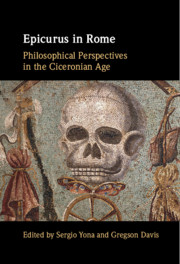Book contents
- Epicurus in Rome
- Epicurus in Rome
- Copyright page
- Contents
- Illustrations
- Contributors
- Acknowledgements
- Chapter 1 Introduction
- Part I Epicurus and Roman Identities
- Chapter 2 Sint Ista Graecorum: How to be an Epicurean in Late Republican Rome – Evidence from Cicero’s On Ends 1–2
- Chapter 3 Cicero’s Rhetoric of Anti-Epicureanism: Anonymity as Critique
- Chapter 4 Was Atticus an Epicurean?
- Chapter 5 Caesar the Epicurean? A Matter of Life and Death
- Chapter 6 Otium and Voluptas: Catullus and Roman Epicureanism
- Part II Epicurus and Lucretian Postures
- Bibliography
- General Index
Chapter 3 - Cicero’s Rhetoric of Anti-Epicureanism: Anonymity as Critique
from Part I - Epicurus and Roman Identities
- Epicurus in Rome
- Epicurus in Rome
- Copyright page
- Contents
- Illustrations
- Contributors
- Acknowledgements
- Chapter 1 Introduction
- Part I Epicurus and Roman Identities
- Chapter 2 Sint Ista Graecorum: How to be an Epicurean in Late Republican Rome – Evidence from Cicero’s On Ends 1–2
- Chapter 3 Cicero’s Rhetoric of Anti-Epicureanism: Anonymity as Critique
- Chapter 4 Was Atticus an Epicurean?
- Chapter 5 Caesar the Epicurean? A Matter of Life and Death
- Chapter 6 Otium and Voluptas: Catullus and Roman Epicureanism
- Part II Epicurus and Lucretian Postures
- Bibliography
- General Index
Summary
Though Cicero offers his most explicit, detailed critiques of Epicureanism in De Finibus and De Natura Deorum, his anti-Epicureanism consistently works itself into a wide swath of his theoretical writings over the last 13 years of his life. Therein Cicero consistently uses a rhetorical strategy whereby he avoids naming the Epicureans outright. Instead he employs a series of shorthand descriptions to attack the Epicureans for what he understands to be their basic tenets. In employing this tactic Cicero both slights the Epicureans by leaving them unnamed and reduces their philosophy to a set of behaviors that he thinks best encapsulate their beliefs. They fail by believing the soul to be mortal, by prioritizing an animal-like desire for pleasure over ratio and oratio, and by using quasi-commercial calculations to make ethical decisions. In each of these ways they fail most of all in Cicero’s eyes by representing a threat to the social fabric of the republic.
- Type
- Chapter
- Information
- Epicurus in RomePhilosophical Perspectives in the Ciceronian Age, pp. 37 - 54Publisher: Cambridge University PressPrint publication year: 2022
- 1
- Cited by

